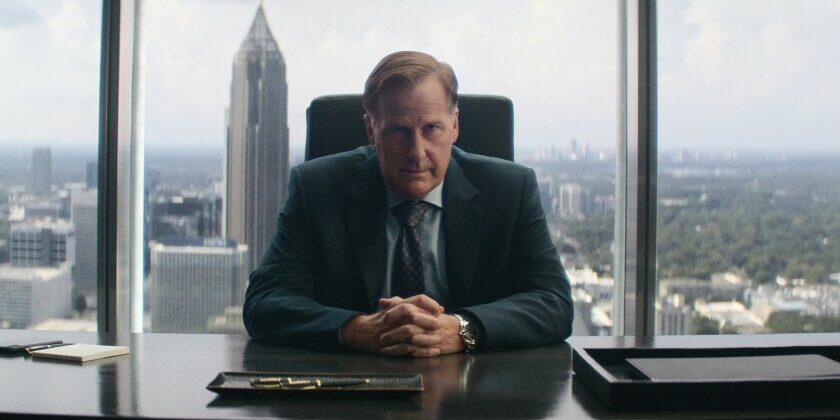Justified: City Primeval is a show about honor, profit, and justice among the rich and poor, black and white.
Getting the New South Wrong
Tom Wolfe was the only major American literary figure of his time with a reputation for conservatism. As academia, the college class in general, and the elite media particularly became precious, Wolfe became almost a figure of populism among our major writers. He dedicated the last part of his career to writing very successful novels in order to return America’s gaze upon itself, observing society, commenting on manners and mores, and satirizing the arrogant cowardice of American elites.
The most successful of Wolfe’s novels is A Man in Full, which sold more than a million copies in 1998. It’s a strange mix of the two themes dearest to Wolfe’s heart: social satire and Stoic manliness. The setting is Atlanta, the context is the new wealth of the new South mixing with the new democracy attracted by that wealth. The incident that sets off the plot is racial politics. A black football player is about to face rape accusations, the victim is a white girl of patrician breeding. The powerful people in Atlanta fear a race riot.
Modern Atlanta is run by black people, but the money is still in the hands of white people. Moreover, modern money is in the hands of what David Brooks at about that time called bourgeois bohemians—not older Southerners—effete rather than manly types. All of these contradictions, changes, and tensions in American life make for dramatic interest. After all, conflict is the beating heart of drama and Wolfe was willing to dramatize America’s conflicts, because everyone else was busy avoiding them.
The End of Satire
Twenty-five years after the novel’s success, A Man in Full has been adapted for Netflix by one of the very successful showrunners of our time, David E. Kelley, who wrote all six episodes. In the process, everything that made the story interesting has been wiped out. Now set in the 2020s and, at the same time, to the most vulgar taste to which our elite propaganda caters, the series has no trace of satire. Progressive liberals cannot laugh or even smile at the hypocrisies of our society. Racial issues are useful only for moralistic purposes in which black characters are portrayed as noble achievers, rather like the idealized families one saw in ’50s ads which are today routinely scorned; the only difference is that in this portrayal, feminism replaces any relaxation, and victimization becomes the preferred excuse for privilege.
So there cannot be any talk of a black man committing a crime. Instead, there’s an old white man accused of rape. Moreover, the alleged rapist is a contender for the Atlanta mayoralty, a populist conservative figure running against a charming, if ruthless young black man who talks about having studied John Rawls. This makes no sense to anyone who is even remotely familiar with Atlanta politics: Democrats run the city and black Democrats have been mayors since the 1970s, including a couple of women in the twenty-first century. Far from reading nonsense like Rawls’s A Theory of Justice, also a 1970s publication, these are city politicians who find it hard to escape prison for various corrupt dealings. But even 50 years later, it is necessary to have villains in the show, that those villains be a political threat, and that they be white. It is a small price to pay if we replace reality with fantasy in the process.
Race riots are also unacceptable as a subject for storytelling, unless it is the kind of propaganda we have seen since BLM came on the Progressive scene, which triumphed after the death of George Floyd. Instead white police brutality against black people becomes the subject of the show to the point that it derails the series. Nor is it possible to show Wolfe’s very funny “freaknik” scene from the beginning of the novel, where young affluent black people indulge in spring break barbarism in a tony neighborhood, shocking the white people.
There is wisdom in A Man in Full, but you have to pick up the book to get to it.
Instead of social commentary, we get a soap opera about two black couples who try to brave the criminal justice system and achieve a symbolic victory against, I suppose, racism. One couple is distinctly upper-middle class, Roger and Henrietta White. He’s a lawyer for protagonist Charlie Croker, a real estate tycoon. She’s his rock of strength in his time of trial, he wouldn’t be able to face the world without her. Symbolically, Roger turns from corporate success to taking on a criminal case to help a young black man unjustly imprisoned, fulfilling the pieties of our elites. However, in terms of plot, this makes no sense, since it makes the protagonist’s lawyer and fixer unavailable to him when he’s about to go bankrupt. The other couple is also connected to Croker: His secretary, Jill Hensley, and her husband, Conrad, the jailed man. Symbolically, they’re the future. She’s successful, he’s supportive, they’re pregnant.
Needless to say, the black characters in Wolfe’s novel are not civil rights heroes and victims. They are the kind of people we suspect most successful people to be—neither uniquely exempt from moral failures, nor unusually prone to them. Wolfe wrote for a middle-class audience whose confidence he wanted to boost by mocking the pretensions of our elites. On Netflix, however, his story becomes a vindication of the prejudices of people who aspire to elite status by despising that same middle class. This is ultimately why the adaptation fails.
Stoicism and Manliness
But A Man In Full is not just a social satire, it is also an exploration of the problem of manliness in the context of the South, the most violent and martial part of the country. Charlie Croker is a former football star. Southerners worship football about as much as they do Christianity, so he can trade on that celebrity to become a real estate developer, a job which requires charming people but also dominating them in the way in which impressive buildings dominate us. A vulgar, but effective image of grandeur. His confidence makes people believe that they will get what they want: a profit on their investments and a certain status. So they bet on him because he bets on himself. In a strange way, popular hopes depend on his greatness.
Moreover, Charlie is lord of a plantation, Turpmtine, where he shoots quail, rides horses, and entertains the aristocratic memories and fantasies of the South. Success on a grand scale in America is not enough if he’s not a man; nor is manliness enough if it doesn’t involve mastery of nature, of the land and the beasts thereon. And not even that would be enough if it didn’t involve a theological reflection, since all human things are changeable and the longing of his heart is for immortality, which is what leads him to overleap himself, end up in debt, and face bankruptcy.
There is none of this in the series. Croker is played by Jeff Daniels, who has nothing of the aggression and strength of the character. He’s too soft and therefore exactly prepared to play an arrogant white guy whose redeeming feature on his way to a deserved, inevitable downfall is being a good ally to the two black people who work for him. All there is to this guy is a midlife crisis, fear of aging, and a meaningless eccentricity. The price of telling his story on Netflix is denying him any connection to the aspirations of American men, who are not part of the intended audience. Thus, even the title becomes meaningless, there can be no man in full, only a male who supports a woman.
Wolfe offers, along with criticism of Croker, a vision of Stoicism succeeding rather better in another white man in trouble in a black community—his character, Conrad Hensley, in Oakland. Conrad loses the little he has in life, but in the process, trades his heavy metal for Epictetus once he ends up in jail—a weak imitation of manly agony is replaced by a teaching about facing agony fearlessly—and identifies with Zeus as a principle of cosmic justice. By a long train of unlikely events, Conrad ends up helping Croker hold on to his integrity. There is much comedy in their story, but also a reflection on the way Americans, unlike Conrad, are paralyzed by cowardice.
All of this is sacrificed in the Netflix adaptation. The novel is worth reading both for its satirical treatment of society—which should guide writers, pundits, and even politicians—and for its insistence on the crisis of manliness, which Wolfe understood long before it became obvious to everyone. As a writer, Wolfe rejects sentimentality and flattery of the audience; his story suggests insistence on human nature is preferable to the conquest of nature. There is wisdom in A Man in Full, but you have to pick up the book to get to it—in this case, the limited TV series really is no match. Perhaps we bought the luxury of streaming TV at too high a price, if shows turn, in effect, into the most efficient, but invisible, censors in our society. Wolfe’s wonderful stories should be brought to a new generation of readers, but it won’t happen because of Netflix.



